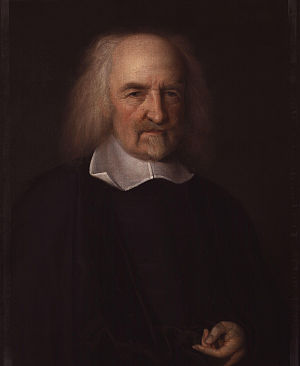
“No arts; no letters; no society; and which is worst of all, continual fear and danger of violent death; and the life of man, solitary, poor, nasty, brutish, and short”
Share this quote:
For it can never be that war shall preserve life, and peace destroy it.
Share this quote:
“The condition of man . . . is a condition of war of everyone against everyone.”
Share this quote:
“The slave of fear: the worst of slaveries”
Share this quote:
“We have to start teaching ourselves not to be afraid”
Share this quote:
“It is not wisdom but Authority that makes a law”
Share this quote:
“Of two cowards, the one who finds the other out first has the advantage”
Share this quote:
“A fear of weapons is a sign of retarded sexual and emotional maturity”
Share this quote:
Hell is truth seen too late.
Share this quote:
Felicity is a continual progress of the desire, from one object to another; the attaining of the former being still but the way to the latter.
Share this quote:
Now I am about to take my last voyage, a great leap in the dark
Share this quote:
Curiosity is the lust of the mind.
Share this quote:
Force and fraud are in war the two cardinal virtues.
Share this quote:
And because the condition of man . . . is a condition of war of every one against every one, in which case every one is governed by his own reason, and there is nothing he can make use of that may not be a help unto him in preserving his life against his enemies; it followeth that in such a condition every man has a right to every thing, even to one anothers body. And therefore, as long as this natural right of every man to every thing endureth, there can be no security to any man, how strong or wise soever he be, of living out the time which nature ordinarily alloweth men to live. And consequently it is a precept, or general rule of reason: that every man ought to endeavour peace, as far as he has hope of obtaining it; and when he cannot obtain it, that he may seek and use all helps and advantages of war. The first branch of which rule containeth the first and fundamental law of nature, which is: to seek peace and follow it. The second, the sum of the right of nature, which is: by all means we can to defend ourselves.
Share this quote:
The first and fundamental law of Nature, which is, to seek peace and follow it.
Share this quote:
For, from the time that the Bishop of Rome had gotten to be acknowledged for bishop universal, by pretence of succession to St. Peter, their whole hierarchy, or kingdom of darkness, may be compared not unfitly to the kingdom of fairies; that is, to the old wives fables in England concerning ghosts and spirits, and the feats they play in the night. And if a man consider the original of this great ecclesiastical dominion, he will easily perceive that the papacy is no other than the ghost of the deceased Roman Empire, sitting crowned upon the grave thereof: for so did the papacy start up on a sudden out of the ruins of that heathen power.
Share this quote:
Silence is sometimes an argument of Consent
Share this quote:
The universe, the whole mass of things that are, is corporeal, that is to say, body, and hath the dimensions of magnitude, length, breadth and depth. Every part of the universe is ‘body’ and that which is not ‘body’ is no part of the universe, and because the universe is all, that which is no part of it is nothing, and consequently nowhere.
Share this quote:
For such is the nature of man, that howsoever they may acknowledge many others to be more witty, or more eloquent, or more learned; Yet they will hardly believe there be many so wise as themselves: For they see their own wit at hand, and other mens at a distance.
Share this quote:
Another doctrine repugnant to civil society, is that whatsoever a man does against his conscience, is sin; and it dependeth on the presumption of making himself judge of good and evil. For a mans conscience and his judgement are the same thing, and as the judgement, so also the conscience may be erroneous.
Share this quote: